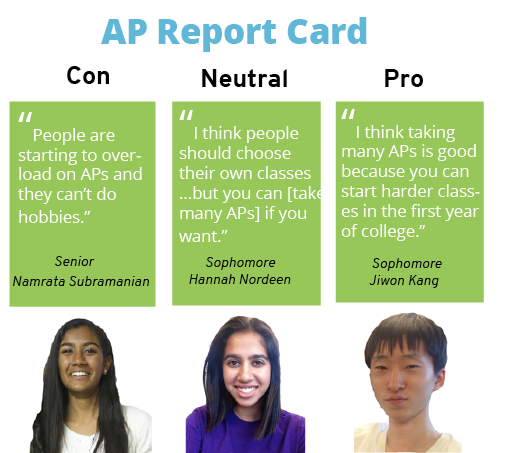Every year, the chances of getting into Ivy League universities drop at an alarming rate. Cornell University, once known for its friendly acceptance rates, dropped from a 31 percent in 2007 to a meager 14 percent for the class of 2018. The numbers are even slimmer for Stanford University. Last year, Stanford had a record-low acceptance rate of only 5.05 percent, accepting 2,145 students out of the 42,167 that applied.
However, these dismal acceptance rates create a false impression of this seemingly necessary undertaking ó the belief that overloading AP classes guarantees entrance to a top school. On its website, the Harvard administration explicitly states that, ìWhile the heart of the matter will always lie in academic promise, we prize candidates with special talents and with outstanding personal qualities.î
Overloading on APs is not an outstanding personal qualityóin fact it has the opposite effect. The more students cramming AP classes, the more their peers struggle to stand out. That then raises the bar for others and the cycle continues. The competition only gets stiffer. With more students taking more AP classes throughout their high school careers, the less impressive it becomes. If the average amount of AP classes is increased consistently, it will reach a point where it isnít humanly possible to take any more APís. In other words, a talent is no longer a talent if it is the norm.
Ultimately, AP classes should be taken with the interest to truly learn a subject rather than that to appeal to colleges as it amounts to a lack of critical thinking skills and superficial knowledge about the subject itself. Taking too many AP classes takes up a lot of time which could devoted into much needed relaxation time to prevent stress.
Surprisingly, many admission advisors and well esteemed lecturers disapprove of. Denise Pope, senior lecturer at Stanford University and cofounder of non-profit organization Challenge Success, recently published a research paper examining the question of whether or not AP classes help with a studentís learning. In an interview with the Stanford Report, Pope stated her views on on the conditions of taking AP classes.
If you are truly interested in the subject, thereís a good teacher and youíre surrounded by motivated students, then youíre probably going to have a good experience from taking a more advanced class,î Pope said.
If students overload AP classes with the intention of appealing to colleges rather than for a genuine interest in learning, AP classes will ultimately become burden. In other words, forced learning.
If students overload AP classes with the intention of appealing to colleges rather than for a genuine interest in learning, AP classes will ultimately become burden. In other words, forced learning.
One major side effect of this is that students do not strive for true understanding. They are more focused on showcasing their ability to take on a rigorous course load and score well on the AP test, in hopes of admission from top universities.
When administered in 1955, the AP tests were initially intended to provide high schoolers with the option to skip basic college level classes. While AP tests still maintain that function today, the purpose of taking them has slowly evolved into demonstrating to colleges both an understanding for a diverse repertoire of subjects and the ability to work at the proficiency of a college freshman. However, truly learning 10-12 in-depth subjects is a monumental undertaking that will require vast amounts of time; and there is simply not enough time in the lives of modern high-schoolers. Students focus on learning about succeeding at the AP test rather than learning the subject itself.









